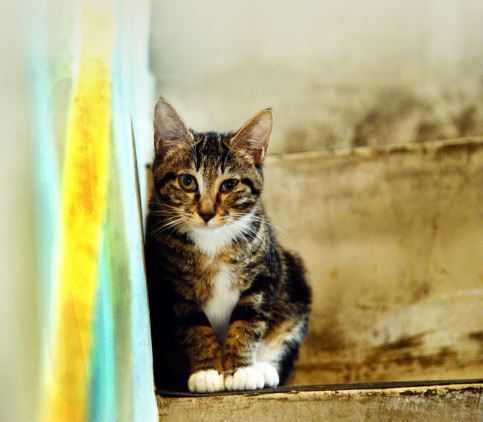[Weekender] Stature of cats ‘catapults’ in Korea
Shedding misconceptions, cats emerge favored pet for their Korean ‘butlers’
By Lim Jeong-yeoPublished : Aug. 4, 2017 - 16:58
In South Korea, cats had been shunned for their association with evil forebodings and bad luck. In the early 1990s, for instance, my mother did not allow me to have a cat because their cries, sounding like a newborn, would give her goosebumps.
Cats don’t warm up to people as instantly as dogs do. This led some people to believe cats to be disloyal and aloof. Cats were also thought to be spiritual. When a cat stared in to the vacant air with their glowing narrow-slit pupils, the superstitious bunch of Koreans assumed the animal was seeing ghosts. In the minds of the fearful, cats were a vengeful animal. If not, why would they bring back dead birds and mice to the house? Edgar Allen Poe and Halloween didn’t help.
Such false beliefs about cats are largely gone, as Korea is becoming an aging society and the number of single-person households is surging. More cats are being taken in as housemates for those living alone, who have found cats to be dependable companions.
Cats don’t warm up to people as instantly as dogs do. This led some people to believe cats to be disloyal and aloof. Cats were also thought to be spiritual. When a cat stared in to the vacant air with their glowing narrow-slit pupils, the superstitious bunch of Koreans assumed the animal was seeing ghosts. In the minds of the fearful, cats were a vengeful animal. If not, why would they bring back dead birds and mice to the house? Edgar Allen Poe and Halloween didn’t help.
Such false beliefs about cats are largely gone, as Korea is becoming an aging society and the number of single-person households is surging. More cats are being taken in as housemates for those living alone, who have found cats to be dependable companions.

The estimated number of domestic cats in Korea stood at 1.15 million in 2012, according to data provided by the Ministry of Agriculture, Food and Rural Affairs. The figure jumped 64 percent to 1.89 million from 2012 through 2015, marking a dramatic rise in feline companions here.
“Most of the older-generation Koreans who dislike cats grew up watching summertime horror shows that juxtaposed cats alongside tombstones and blood-stained white lace,” said Kim Jea-young, founder of the Korean Society of Feline Medicine, who once conducted cultural research on why people of certain age groups showed such aversion to cats.
Kim is also head physician at a cats-only veterinary clinic in Seoul.
“But among younger Koreans, it appeared those who were exposed to Japanese animated movies ‘The Cat Returns’ and such were more prone to show an affinity towards cats,” Kim said. Japan is known for its wide array of cultural contents spun off from the feline character. Japanese cherish cats as symbols of wealth and good omens.
“The relatively calm and independent nature of cats also suits the modern one-person household lifestyle. And with the younger generation embracing feline companions, their parents’ generation is also indirectly seeing the charms of cats,” Kim said.
Compared to dogs, cats tend to take good care of themselves. Cats know where to relieve themselves and how to keep tidy. Cats don’t have to be bathed regularly, nor do they require daily walks. Cats ask for less and yet they still offer healthy doses of daily emotional support, at least in the eyes of cat lovers.
Cat owners in Korea sometimes refer to themselves as “butlers,” suggesting the actual nature of the relationship. To the butlers’ doting eyes, it’s the cats who call the shots at home and humans who serve them faithfully.
Some human butlers do not hesitate to spend money for their feline masters, fueling the growth of high-end products and businesses targeting cat owners.
Solid wood cat towers, organic cat food and other products for cats with price tags higher than human goods are among the expanding offerings for the whiskered masters. People now love to zone out while watching cats frolicking about in streaming videos, too. Korean YouTube channel “Cream Heroes,” featuring daily tidbits of life with cats, has so far attracted more than over 54 million views.
A telling sentence once swirled on social media here: “Everyone has cats. Everyone except me.”
Luckily, I belong to the “everyone.”
As soon as I started living in Seoul away from my home and family, who have by now given in to my love for cats, I adopted Prince, a beautiful abandoned kitty with a long white coat. Prince sprints toward the door to welcome his butler when I come home after work. I could never understand why this adorable companion had been abandoned in the first place.
Perhaps the previous owner of Prince had his or her reasons. But one should be aware that taking in a cat, or any pet for that matter, is like signing on for a committed relationship. Unfortunately, the number of abandoned cats in Korea is going in proportion with the expansion of cat owners. A survey shows that around 250,000 cats were abandoned or lost last year.
The average lifespan of cats is about 15 years, but some healthy cats live for up to 25 years. It’s a companionship that should not be taken lightly, a fact that I am happily reminded of whenever I see Prince jumping into my welcoming arms.
By Lim Jeong-yeo (kaylalim@heraldcorp.com)







![[KH Explains] How should Korea adjust its trade defenses against Chinese EVs?](http://res.heraldm.com/phpwas/restmb_idxmake.php?idx=644&simg=/content/image/2024/04/15/20240415050562_0.jpg&u=20240415144419)










![[Today’s K-pop] Stray Kids to return soon: report](http://res.heraldm.com/phpwas/restmb_idxmake.php?idx=642&simg=/content/image/2024/04/16/20240416050713_0.jpg&u=)